Nairobi Dancer Irene Renée Karanja and the Dashy Krew – An Interview
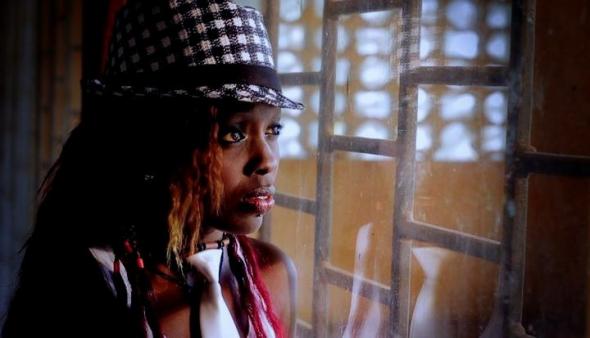 The most interesting things happen often completely unexpected. On a trip to Nairobi, being busy with the Solo and Duo Festival of Dance Forum Nairobi I came along the dynamics of inspiring artists in the GoDown Art Centre located in the industrial area of town. There I had the coincidental chance to meet the dancer Irene Karanja in a daily rehearsal program for a dance show choreographed by Fernando Anuang´a. Her artist name is short: Renée.
The most interesting things happen often completely unexpected. On a trip to Nairobi, being busy with the Solo and Duo Festival of Dance Forum Nairobi I came along the dynamics of inspiring artists in the GoDown Art Centre located in the industrial area of town. There I had the coincidental chance to meet the dancer Irene Karanja in a daily rehearsal program for a dance show choreographed by Fernando Anuang´a. Her artist name is short: Renée.
She and her colleague Victor Raura enact impressive complex and diverse dance techniques, changing their styles from Contemporary to Break Dance to Locking to Crumping to Afrofusion. They belong to and shape the style of the Nairobi based Dance Compagnie Dashy Krew with their extraordinary unique fusion dance style and their satirical approach on the way to fulfill their dreams. Dashy Krew was founded 2003. The company is hard working, experimenting with forms and aesthetics, engaged in teaching younger dancers in Buruburu and very successful commercially. All six professional dancers of the company can live from their income as performing artists. They represented Kenya in a Pan-African Dance Festival and won the third price for their stage performance of the Continent. After rehearsals we had tea together, were chatting and sharing jokes. Days later the dancer Irene Renée Karanja offered me an interview giving an insight into her realities, ambitions and visions. Here it comes:
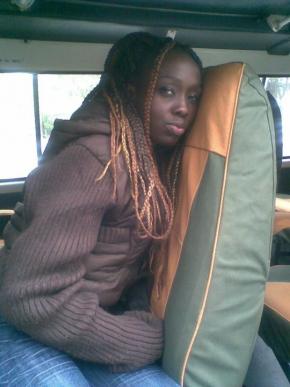
When did you start to dance?
I started dancing professionally with Dashy Krew from 2004 until now. Before that I was just taking dance as a hobby. In High School I was a traditional dancer, taking part in several competitions. Yeah. Nowadays I am representing Dashy Krew. Dashy is a 8-years-old dance compagnie mainly busy with HipHop Dance. But we engage a lot in other styles like Contemporary Dance, African Dance and others. We mix and match everything. Right now I have majored in Crump Dance.
How do you work, train and rehearse in Dashy Krew?
For the Crumping style I did many individual researches. There came also dancers from abroad sometimes. We bumped into each other and socialized. We shared trainings and learned from each other. In Dashy Krew we dance from Monday to Friday usually from 11 o´ clock until 8 o´clock in the evening. But right now I am rehearsing here for a dance show created by Fernando Anuang´a. That is why I come these days down here to the GoDown Art Centre from 9 am until 1pm. This is our third week of rehearsals. We practice, rehearse and get things together. Then after lunch Vic and me go all the way to Buruburu and continue to dance with our crew until 8 o´clock. Every one of the dancers in Dashy Krew is professional and has dance education. We taught ourselves. We have learned from Internet, we have learned from TV, DVDs, tutorials, workshops and things like that. But all of us have a background of dance. In High School we got offered different traditional dances. And HipHop was a thing we really admired! We did not have that kind of schools for HipHop Dance technique. So we took DVDs and started to learn for ourselves. That’s a really hard way to learn, because you spend more time. It takes a while that you come up with the moves. It is much harder to get it that way. No one tells you the basics. You have to watch, try out and learn. But since you get it, it becomes much easier from that point on for all other movements. We took a long time and used to practice very hard. If dancers or choreographers are coming to teach us, we get it fast. That’s the result of receiving that knowledge and those techniques through the hard way. We organized also our own workshops like the Street Dance Workshop. That one is happening annually in Nairobi and we have the fifth one coming week. That is a great event. We have so many break dancers nowadays in Nairobi. But you know there are break dancers, who got so much exploited. Our country is not supporting Break Dance. We started the workshop with the idea to bring all of them together, teach them more and open up their minds. We try to inspire them to bring elements of our culture into Break Dance. We start to work with elements of Luo, Massai, Kikuyu dances, because all of us know how they dance. In school we learned it. Most of the guys in our crew have that background. That is a very huge basis. It helps us to have an open mind, to come up with new styles and not to get locked up in one single dance style. We do not know all details of separate dance forms, but usually we take single moves. As an artist you have always to come up with something new. So we put traditional music into the sound system, the music takes over and we try to flow with it. We transform and create a new dance fusion of our own style.
Where do you have your training and working base as Dashy Krew?
It is in Buruburu and that is in Eastleigh of Nairobi. So it is like 40 minutes from GoDown Art Centre. Dashy Krew is made of six members, two women and four men. We used to have an office there. We are connected to the SOS children´s home. It is a very huge compound. They have a youth centre. Our studio is based there. We always liked to do community work as well. There we are teaching dance without charging anyone. We like to teach the children and the youth. We offer others a chance to discover their talents to see what they are good at. So we were picking around fifty youngsters. Then we checked who of them is really interested in dance. If some are really deep in it and interested in a dancer´s career we are auditioning them and try to include few of them into our Dashy Krew stage productions.
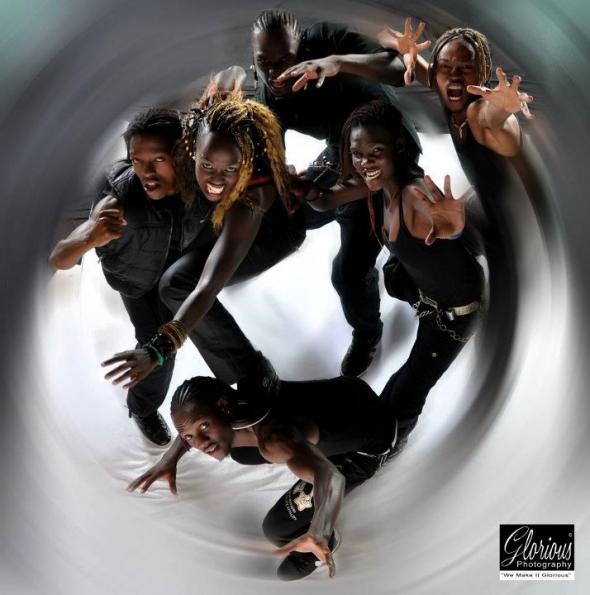
How did you get involved in the dance production of Fernando Anuang´a?
Only Vic and me are involved in it. The rehearsals are part of Fernando´s dance piece “Identity”. He auditioned some weeks ago and was looking for individual dancers. He was precisely looking for individual dancers identifying with their own unique style. They also have to enjoy what they are dancing. For example, I love Crumping.
So everyone is dancing on stage in what he or she is really good at. Then another dancer joints the scene and complements what has been danced before. We have synchronized parts for the whole group, but mostly it will show solo dance parts. Fernando moved around auditioning. He checked all dancers from Nairobi and two of our members past. The spectators of his show will be mainly artists but also producers. So we will perform it at the Alliance to get sponsorships, connections and all that. But we also want to perform it for dancers, so that other Kenyan dancers can embrace that culture. Most dancers over here are much more westernized. They copy a lot from there. But what they don´t know, is, these Western guys are looking up to us. This here is the ground where the dance came from. We are trying to help Kenyan dancers not to judge or to ignore African Dance forms. But for us it is also important to show a dance fusion. HipHop and African Dance are not so different from each other. If you fuse them, you get something really special. We get our incomes from such shows. First of all Dashy Krew is a freelance project. We don´t depend on someone. We usually go around looking for contracts. We get them from cooperating companies, but our biggest dream is to get that one sponsor for all our stage works. We have sponsors here, but they want to exploit you. They want to use you. You dance and go for shows, but they just pay you bad. Or they don´t even pay you at all. So nowadays we think in bigger dimensions and we want to go international.
Do you also perform in theatre halls or in cultural institutions of Nairobi?
We perform mainly for different companies, depending on their programs and their interest in our work. Usually we perform for huge companies like Coca Cola, Phat Entertainment, Kenya Bureaus Limited, several Phone companies. These are dancing options, if companies are launching their products. That is challenging, because you have to present yourself first of all. Usually we have a marketer. So he is informed and knows which show is happening when and where in town. But we have to go to meetings ourselves. And we go to auditions. Clients know what they want. Sometimes they want a style which is not in our comfort zone. So maybe they want to have Salsa or such dance styles. But for us to survive we decided to have at least basics in every style we can catch up. You get more cash that way. Let´s say they want to launch a new phone. Then they want to know our concept and to gather ideas. So it is our task to come up with a dance that circulates around the product. Then we have to show them.
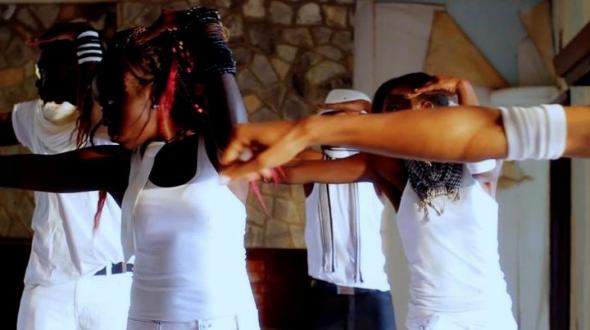
Do you also have an artistic requirement for your work?
Yes we have. But, well, the dance as an art form does not pay you much. We used to create so many performances. We worked for charity events and all that. But, you know, we worked so hard and we have targeted something that pays our needs. The money is with the cooperating companies. I mean, those ones pay you at least. We can live from that. Yes.
But there is a certain level, where dance is not supported fully. When it comes to dance I cannot compare our country with others. You have to imagine, from how far we came. I told you, that we dance since more than eight years. The first five years were really bad for us and we continued. We faced exploitation. Here are no official dance schools. In Kenya dance as an art form has not gone to a certain level of institutionalization. On an international level dance is supported. But here companies still don´t respect dancers. You know, we don´t get as much as artists should get. It is even hard to find commercial dance jobs. We are really trying hard to get somewhere, because I believe in the saying `hard work pays´. We are reaching out there and work with dance.
In August a charity organization came around here. They wanted to work with Kenyan dancers, going out into the slums, working with kids there for teaching them etc. That was such an exposure. We posted our short video on You Tube and through that channel they came across us. They called us and included us into their project. They ended up giving us a job and paying us, because they really loved what we did. These guys came from the US. Now we work together. Hopefully through that connection another door can open.
What do you think would be needed to improve the situation for dancers or choreographers in Nairobi?
One thing I noticed from the dancers in Kenya is that they copy too much technically. If you see the international dance market level you realize that the dance level is crazy high. Then I recognize that we live in a “third world” and the worst thing you can do is copying. If you decide not to be original as a dancer, that’s it. It will not take you anywhere. I guess, people don´t want to stay over here. It is not our fault. Our country is not supporting dance. I know people want to leave and go out. But it would be nice, if they would represent the dance there with something more original, you know. One thing is to become more original. It means also to give dance more time of practice. That is what the most dancers here are lacking. They might go for two hours, but real professional dancers train for eight hours and more each day. It is a hard work. There is nothing easy.
Another thing: if you are serious in dance profession and you want to be taken seriously for dance jobs etc., you have to be organized. Dancers and choreographers have to have a CV and to choose where they are going to. You have also to present yourself in business surroundings, so that people learn to respect you. Dashy Krew is officially registered. And personally I think if it would not have been like that, others would still exploit us. They would still think `ah, these guys are taking it for fun. We can use them the way we want´. But today we are a registered company and we can also deny a contract. That is a step to bring us further. Dancers here have to make a brand; they have to have DVDs and internet presence to show what they are doing. That is a way we get noticed. I mean, if we dance for those cooperating companies nowadays they give us whatever we charge them.
Are you involved in Video Dance productions?
Not really. I mean we participated in very important and huge competitions for TV channels like KTN and Citizen. That gave us a lot of exposure. I would love to reach a level as a dancer to be an advertiser, because I believe dance can market products in TV. We are still not there. I mean, you never find a dancer promoting in TV or on a billboard. And if so, it might be once in a century and that dancer is probably not a professional one. It is a friend or a lover of someone who has to make job decisions
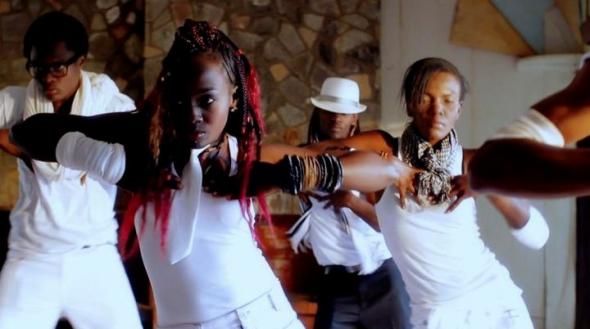
Did you also cooperate in projects with foreign cultural institutions?
For some of the events we cooperated with British Council. We had discussions, talked and worked with them …. But, I don´t know. There are usually certain persons or dance groups who work regularly with the foreign cultural institutions. And I would say the decision making persons in those institutions are changing their minds from time to time. So it might be that they say `mmmh right, we are not dealing with dancers at the moment´. So that is difficult for us. Therefore they are not really interesting for us anymore. You know at the end of the day dancers want just to create a relationship with someone or an institution, if they get the feeling to get appreciated enough. But in those institutions there is a lack of appreciation. First, they don´t pay you good money. But you know that dance is not easy. I mean we have to practice daily and give all our energy into it. Second, what we really lack here is to get appreciation for our artistic productions.
Did you go abroad for performing your dance pieces?
Yes, we went to Nigeria and to South Africa. In 2008 in Nigeria there was a huge competition called 1st ever Malta Guinness Street Dance Competition. Here it was organized from Kenya Breweries. It was the biggest Street Dance competition ever happened here in Nairobi. I mean people came from nowhere. Dancers moved to Nairobi coming from Mombasa, Kisumu, Nyeri and so on. It was a keen and extraordinary event. In Kenya Dashy Krew won the competition and we became the national champions. Therefore we had to go to Nigeria to represent our country. From each African country one dance crew came for representation. There we met other choreographers. The competition happens annually. And for the competition in 2010 they called dancers of the international dance scene to come to Kenya. That was a huge exposure! We won 2008 and got the third prize of the pan-African dance competition that year. If you win, they pay you well. They paid us around 500 000 Kenyan Shilling.
But we were not allowed to participate again. You know, we have so many dance crews here in Nairobi and not many of them are well organized in terms of registering and training. Crews just come up if there is an event. People know how famous we are as Dashy Krew. We have been on TV and all that. So if we would have been allowed to participate in that competition again there would have been a possibility to win again the 1st cup. Well, internationally it is supposed to be like that, isn´t it. Dancers get normally pushed and the others should have beaten us. That is a dance battle, right. But we were confronted with a stupid rule. It was decided in Kenya. Kenya came up with its funny rules and as a consequence we could not perform anymore in this competition. That´s it. Later the Sarakasi Crew went to the competition. They won, went to Ghana to represent their dance for Kenya and there they won like around 4 Mio Kenyan Shilling. These are occasions we wanted to have for a long time and just nowadays they are coming up. And In South Africa we went for the Big Brother show. The rapper and HipHop artist Nonini, a very famous artist of the Kenyan market, called us for performing with him. So we got the chance to perform in South Africa.
What do you think how many dance pieces did you create with Dashy Krew in the last eight years?
Wow, so many! Honestly, these have been so many already. Usually we come up with new stuff so that we can put it aside for certain auditions. If we do auditions we let people get the movement material. At the end of a month they have to dance it. If they pass, they can go with us to several shows. I mean the creation of these dance pieces are the main routines for us. We have more than twenty dance pieces I would say. We have a lot. From the best ones, we produced a DVD.
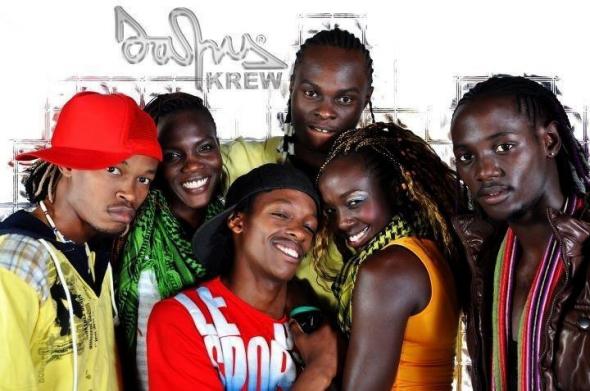
What do wish for your future?
For Dashy we want to build up our own dance school. In fact we would prefer to create a huge space like a university department for dance, choreography and art. That institution would not be only for dance, but also for music, graphics, painting and other art forms. We would love to give our own company courses. We want also to participate in artist-in-residence-programs abroad so that we can improve our skills. At the same time we want to be dance teachers. We want to increase the number of dancers in our Dashy Krew, so that we have enough people who can go all over and perform. In fact we want to do what we are doing right now, but increasing our income. And we want to get more appreciation as dancers.
Thank you very much, Renée.
Thanks to you.